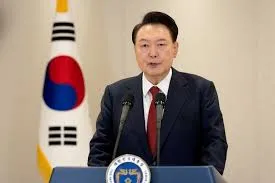
The Legal and Political Fallout of President Yoon Suk Yeol’s Arrest Warrant
A South Korean court has issued an arrest warrant for President Yoon Suk Yeol, who was impeached earlier this month following his brief imposition of martial law.
This unprecedented move marks the first time a sitting South Korean president has faced an arrest warrant. The Seoul Western District Court approved the warrant, citing charges related to abuse of power and orchestrating the 2024 martial law crisis.
President Yoon’s declaration of martial law on December 3, 2024, led to widespread controversy and was swiftly reversed.
The National Assembly impeached him on December 14, suspending his powers and duties, which were temporarily transferred to Prime Minister Han Duck-soo. Subsequently, on December 27, Prime Minister Han was also impeached on charges including obstructing investigations against Yoon and his wife, and colluding with Yoon on the martial law declaration.
The Corruption Investigation Office for High-ranking Officials (CIO) summoned President Yoon multiple times for questioning regarding the martial law declaration, but he declined to attend. The court’s decision to issue an arrest warrant underscores the gravity of the allegations against him.
The Constitutional Court is expected to deliver a verdict on President Yoon’s impeachment by June 2025. If the impeachment is upheld, a presidential election must be held within 60 days.
This development has significant implications for South Korea’s political landscape, highlighting the challenges the nation faces in maintaining democratic principles and the rule of law amid political turmoil.
For more detailed coverage, you can watch the following news report: